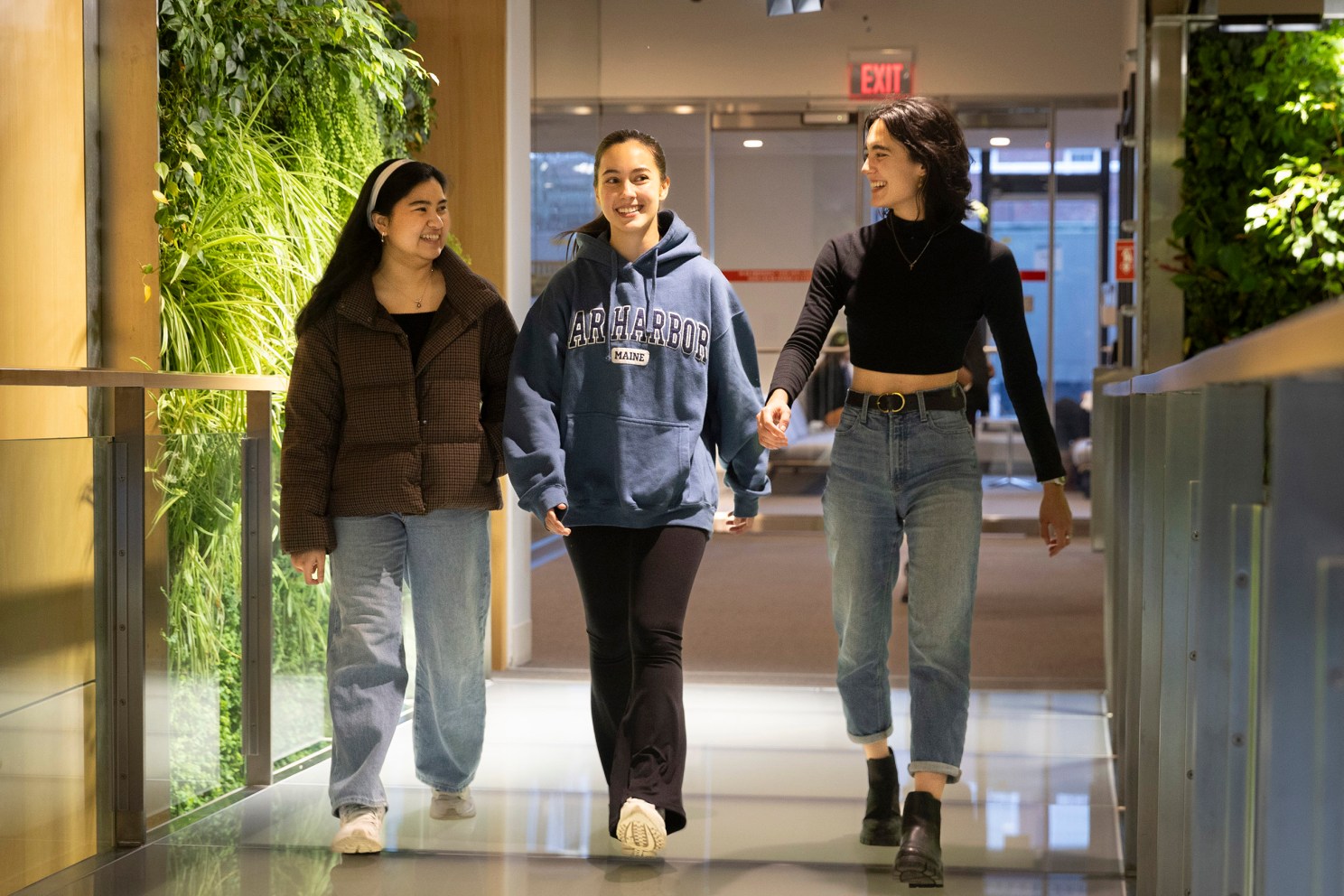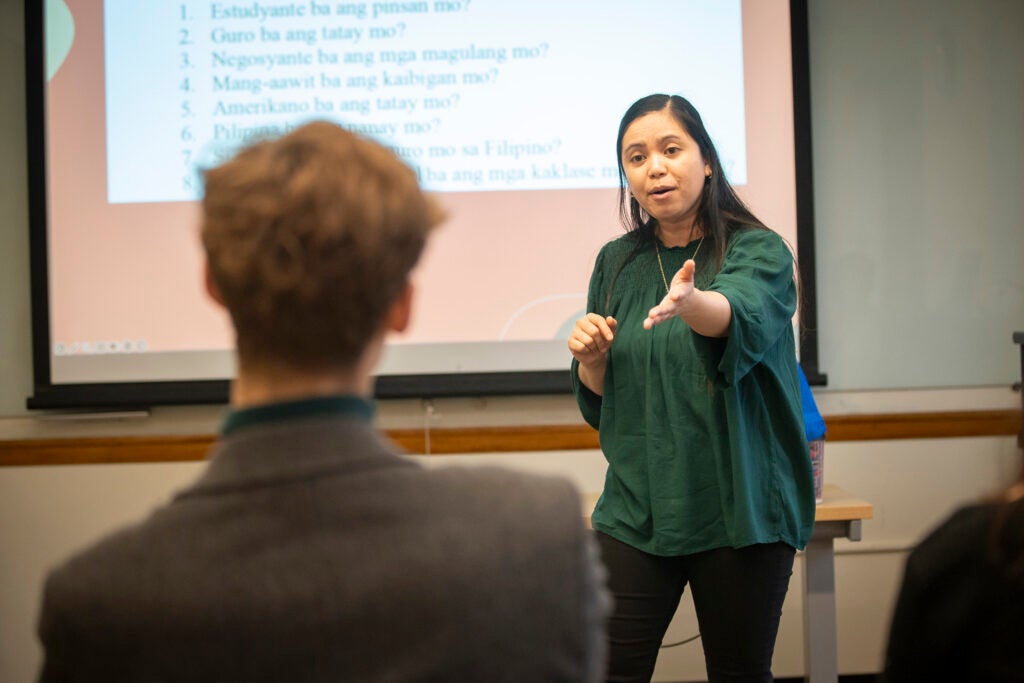Finding community through shared language

Laurinne Eugenio ’26 (from left), Gabrielle Grant ’24, and Eleanor Wikstrom ’24.
Photos by Niles Singer/Harvard Staff Photographer
Students say University’s first-ever classes in Filipino brought deeper sense of culture — and in some cases, stronger ties to family, friends
Gabrielle Grant set a goal for herself in September that she would be able to have a conversation with her mom in Tagalog by winter recess — a target that seemed lofty at the time. The Harvard senior had enrolled in Elementary Filipino 1 (Tagalog) knowing only a few phrases in one of the main languages of her mom’s native country, one of which was “Merry Christmas.”
But by Thanksgiving, Grant found herself sitting down with her mom in their home in Connecticut, pressing record on her phone, and asking in Tagalog about her experience moving to the U.S. from the Philippines, what she liked and disliked about each country, and descriptions of her daily activities.
“It’s very special to be able to talk to my mom in her native language,” Grant said. “The language that I’m using when I talk to my mom isn’t very complicated, but I am able to understand and have a basic conversation with her, asking how the other person is, asking what they’re doing on a certain day.”
Filipino language courses were offered at Harvard in the fall for the first time. Filipino, which is based on Tagalog and enriched by other native languages, is the lingua franca on the nation of more than 7,000 islands where more than 100 languages are spoken. Beginning and intermediate courses were taught in the first semester, and an advanced level has been added for spring.

Preceptor Lady Aileen Orsal, who grew up in Cavite province in the Philippines and taught at Northern Illinois University and Cavite State University before coming to Harvard, said she is excited to be the one teaching the new language offering at Harvard.
“It really has a big impact, not only to Harvard and the students themselves, but I believe that it also highlights the value of language, which is one of the most commonly spoken in the U.S.,” Orsal said. “It reinforces the value of our national language, even to Filipinos in the Philippines. It also acknowledges the contribution of the overseas Filipino workers, the migrants, and the growing Filipino diaspora in the world.”
Orsal, whom the students address as ate, meaning older sister or friend, said she tries to emphasize the importance of language for communication, and for identity.
“Language is not just something that you use to talk to people,” Orsal said. “This is social; this is cultural; and this could be transformational for someone.”
Most of the students in the beginner course this fall grew up in Filipino or Filipino American families, with varying degrees of exposure to the language.
Sophomore Laurinne Eugenio, who completed the intermediate class this fall, was born and raised in the Philippines until age 12, when her family immigrated to the U.S. Although she spoke Tagalog with family, she didn’t have much opportunity to practice and learn outside the home.
“I could understand the language pretty well, but where I struggled was the speaking part of it,” Eugenio explained. “I’m used to speaking ‘Taglish,’ which is like Tagalog and English. I would just resort to the English or Taglish version of a word, rather than thinking deep enough to find a synonym.”
Orsal’s beginner class focuses on basic communication, introducing oneself and others, discussing likes and dislikes, and giving directions. In one activity, the class went out into Harvard Yard and took turns acting as tour guides and tourists, describing various landmarks they passed.
“Language is not just something that you use to talk to people. This is social; this is cultural; and this could be transformational for someone.”
Lady Aileen Orsal, preceptor
In the intermediate class, students delve deeper into reading and writing, looking at news articles and sharing their opinions. For her final project this winter, Eugenio read and translated a graphic novel version of “Noli Me Tángere” (“Touch Me Not”) by José Rizal, a book written during the Philippines’ Spanish Colonial period and often read by Filipino high school students.
“I want to be a lawyer, and I would hope that through continued dedication to this course I’m able to fully communicate with Filipinos whom I encounter through my profession,” Eugenio said. “It’s such an important skill to understand someone beyond English and get to know them with the help of our language.”
Orsal says she also learns a lot from talking with her students, whose family cultures and traditions are rooted in different provinces of the Philippines.
“It’s a diverse class talking about a very diverse country of more than 7,000 islands, so there’s a lot going on,” Orsal said. “But at the middle of it is the use of the language that we hope they will be able to practice.”
The Filipino language preceptor position, which is housed in the Department of South Asian Studies, is funded through an endowment made possible by a gift ensuring the language will always be taught at Harvard. The introduction of preceptor positions for Filipino, Bahasa Indonesian, and Thai this year is part of a larger initiative by the Harvard University Asia Center to expand offerings in Southeast Asian studies.
“The time is really now, to do this,” said James Robson, the William Fung Director of the Asia Center. “We have some of the fastest-growing important economies in the world in Indonesia, the Philippines, Singapore, Thailand, and Vietnam. You have that economic success, but you also have major geopolitical concerns in that region, and it also is one of the areas of the world that is going to be particularly subjected to the effects of climate change.”
Eleanor Wikstrom ’24 was one of the students advocating for Filipino language instruction on campus. She said she was glad to be “in the right place at the right time” to show her support for the program. She took the beginner course this fall.
“Because Harvard is such a prestigious university, there’s a responsibility to do what we can to make sure that its pathways are opened up more to members of the Filipino and Filipino American communities,” Wikstrom said. “If something like Filipino gets offered at Harvard, it has ripple effects that extend far beyond campus.”
For many of the students, the course has been more than a language credit — it has helped them build community and reconnect with their own identities. Most are also members of the Harvard Undergraduate Philippine Forum and attend the Filipino language table on Friday evenings to practice conversation skills.
“Growing up I never really had much of a Filipino friend group that I could hang out with. The only Filipino person I was around was my mom. It’s really nice to have that community of friends on campus,” Grant said. “It feels so comfortable with them. It feels like home. And I get to practice the language and learn more about the culture.”
Orsal said the positive student response has been rewarding.
“It is a joy for me as a teacher to go beyond the grade and the classroom requirements and help a student see themselves as a global Filipino who is able to empower others through the language, through the culture, and through being proud of their identity,” Orsal said.




